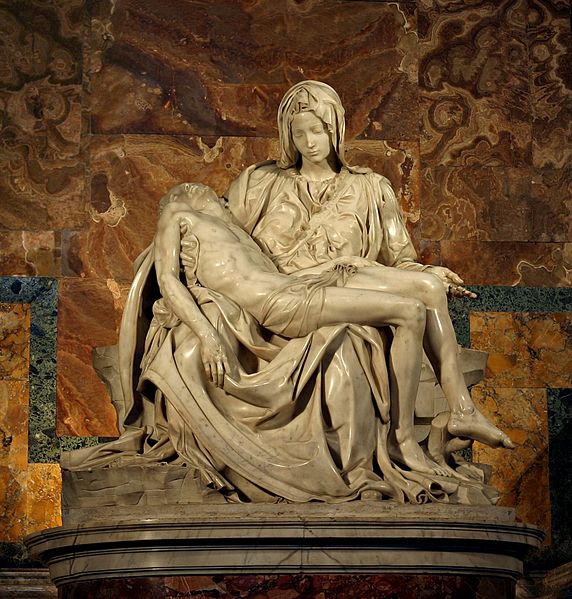Discord and Mercy
Apr 22nd, 2011 by admin
Discord!, composed by Samuel Webbe for the newly-formed London Glee Club in about 1787: It’s first movement is based on a passage from Iliad, but the second verse, it is thought, he composed himself.
Discord!
Discord! Dire sister of the slaughtering power,
Small at her birth, but rising every hour,
While scarce the skies her horrid head can bound,
She stalks on earth, and shakes the world around.
But lovely Peace in angel form
Descending quells the rising storm.
Soft ease and sweet content shall reign
And Discord never rise again.
About 300 years earlier, at age 24, Michelangelo created the Pieta, and by accepting not the Virgin’s grief but her acceptance of fate, sought to stir the beholder to philosophic reflection. “If life pleases us,” he once wrote, “death, being made by the hands of the same creator, should not displease us.”
He turned the nude figure of Christ into the very quintessence of man—a figure in which there was no need, as he put it, “to make the human disappear behind the divine.”
Michelangelo, persuing what he called “the heart’s image,” disregarded conventional reality and substituted for it a set of strange and compelling paradoxes that build into a super-reality. The Christ, though dead, is still alive, His veins distended by the pulse of life, His body limp with sleep, His torso flowing into the mold of his mother’s arm and lap. The Virgin, traditionally represented as a woman disfigured by grief, is here much younger than her Son—the personification of “perpetual purity.”
And while the Christ is life-sized, in keeping with Michelangelo’s obligation to provide a figure as big as a well-proportioned man, the Virgin is bigger than life. Were she to stand, she would be seven feet tall. And yet her head is the same size as Christ’s. One of the wonders of the Pieta is that aberrant proportions like these in no way disturb the viewer.
A work of deep Christian piety, the Pieta also expresses Michelangelo’s Neoplatonic belief that physical beauty is the manifestation of a noble spirit. To critics who carped at the youthfulness of his Virgin, the sculptor had a ready reply—“Do you know that chaste women maintain their freshness longer than those who are not?”
[Illustration by Wikipedia. The World of Michelangelo 1475-1564 The Time/Life Library of Art]
